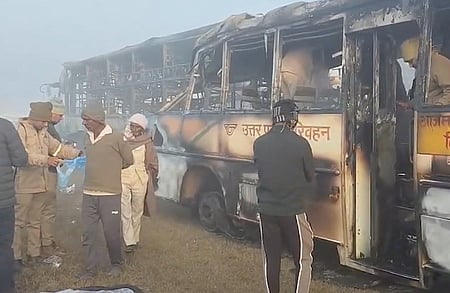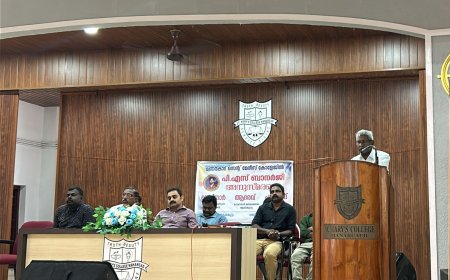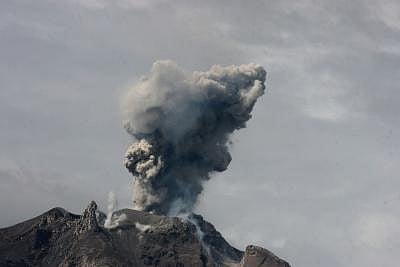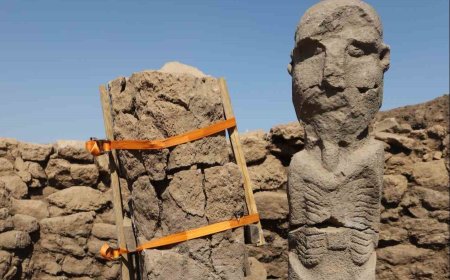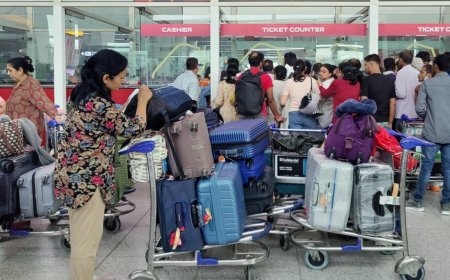India says no cause for concern as Ethiopia volcanic plumes head towards country; ‘situation being monitored’
The Ministry of Civil Aviation is monitoring the situation after the Ethiopian volcano eruption, ensuring coordination among authorities. A NOTAM has been issued, with minimal flight disruptions. The ash clouds are expected to dissipate by 7:30 PM on 25 November.

THE Ministry of Civil Aviation (MoCA) on 25 November alerted parties concerned about the NOTAM issued by the Airports Authority of India (AAI) in a post on the social media platform X.
NOTAM or ‘Notice to Airmen’, is an official alert that provides critical information about changes or hazards in the National Airspace System (NAS) that may affect flight operations.
It has been issued following the eruption of the HayliGubbi volcano in Ethiopia, which has sent ash clouds and volcanic plumes across the continent, towards India.
According to the India Meteorological Department (IMD), the ash clouds are expected to clear Indian skies by 7:30 PM on 25 November and move into China.
What did MoCA state?
In its post on 25 November, the ministry said that it is ensuring coordination between all aviation authorities and that operations across India remain smooth.
“Following the 23 November volcanic eruption in Ethiopia and the eastward movement of the ash cloud, MoCA—along with ATC, IMD, airlines and international aviation agencies—is ensuring seamless coordination,” it stated.
The MoCa post added, “AAI has issued the necessary NOTAM and all affected flights have been kept informed. Operations across India remain smooth, with only a few flights rerouted or descended as a precaution. There is no cause for concern at this moment. We continue to monitor the situation closely and will provide timely updates to ensure passenger safety.”
About Ethiopia's Hayli Gubbi volcanic eruption
Located in Ethiopia's Afar region, approximately 800 kilometres (500 miles) northeast of Addis Ababa, near the Eritrean border, the Hayli Gubbi volcano erupted for several hours on Sunday. This is its first eruption in 10,000 years.
A cloud of ash from the volcanic eruption moved across large parts of northwest India late on 24 November, sweeping over Rajasthan, Gujarat, Maharashtra, the Delhi-NCR, and Punjab.
The IMD offices in Mumbai, New Delhi and Kolkata today issued ICAO-standard SIGMET warnings, which are severe weather advisories. It also advised airports to avoid specific airspace segments and flight levels flagged by the Toulouse Volcanic Ash Advisory Centre (VAAC).
Have flights been cancelled?
Air India and Akasa Air on 25 November said they were cancelling some flights after ash plumes from a volcanic eruption in Ethiopia disrupted operations.
Air India said it had cancelled 11 flights on 24 and 25 November to conduct precautionary checks on aircraft that had flown over certain locations after the eruption, following a directive from India's aviation regulator.
Meanwhile, Akasa said it cancelled flights to Middle East destinations, such as Jeddah, Kuwait, and Abu Dhabi, scheduled for the two days.
According to an ANI report, around 12 international flights between 1 AM and 6 PM on 25 November were delayed as airlines adjusted their operations in response to the volcanic disruption in Ethiopia.
What has the DGCA said?
In a detailed advisory issued on 24 November, the DGCA instructed airlines to strictly avoid published volcanic ash–affected areas and flight levels, and to adjust their flight planning, routing, and fuel considerations based on the latest advisories.
Airlines have also been asked to immediately report any suspected ash encounter, including engine performance anomalies or cabin smoke/odour.
Furthermore, the authority has directed that if volcanic ash affects airport operations, the operator concerned must immediately inspect the runways, taxiways, and aprons.
“Depending on the contamination, the operations may be restricted, and cleaning procedures have to be completed before resuming movements,” it added.
Operators have also been asked to continuously monitor the situation related to the volcanic ash cloud and stay updated through satellite imagery, meteorological data, and other relevant sources.

